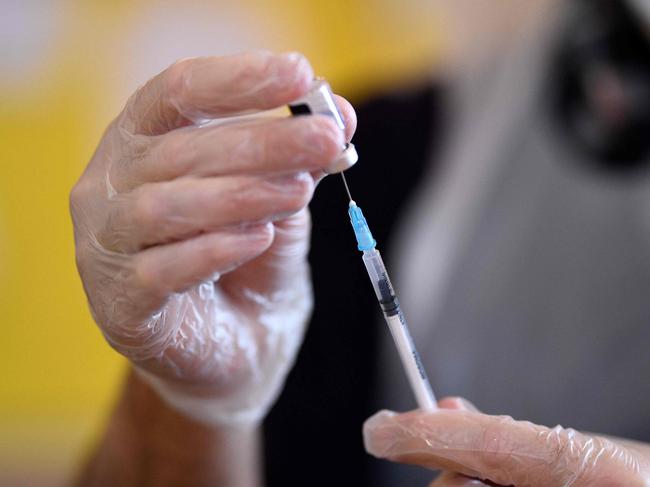New Zealand says 26-year-old plumber’s death ‘probably’ caused by Pfizer vaccine
A 26-year-old plumber’s death from myocarditis two weeks after his Pfizer shot was “probably” caused by the vaccine, a medical panel has concluded.
Illness
Don't miss out on the headlines from Illness. Followed categories will be added to My News.
A 26-year-old New Zealand man’s death from myocarditis two weeks after his Pfizer shot was “probably” caused by the vaccine, a medical panel has concluded.
It’s the second death in the country health authorities have linked to the known but rare condition associated with mRNA vaccines.
The Health Ministry in August confirmed a woman, whose age was not given, had died after receiving Pfizer.
In Australia, no deaths have officially been linked to Pfizer.
Myocarditis is reported in 1-2 out of every 100,000 people who receive Pfizer and 2-3 out of every 100,000 who receive Moderna.
Rory James Nairn died on November 17 at the home he shared with his fiancee Ashleigh Wilson, after complaining of nightly “heart palpitations” in the 12 days following his first dose.
“We put this down to stress as we were in the process of selling and buying a house and planning a wedding,” Ms Wilson told the NZ Herald earlier this month.
“Twelve days later, Rory was up and down again during the night with his heart palpitations and an ‘uncomfortable’ feeling in his chest.”
At 3am on November 17 the couple decided to go to the hospital for “reassurance”.
But within minutes Mr Nairn collapsed.
“It was really, really traumatic,” Ms Wilson said.
“I watched him die and I could not get to him. We were about to leave for hospital and he was in the toilet and I heard a thud. He had fallen, his body was blocking the door, his full weight was against it and I couldn’t get it open. I could just see him through a crack in the door, I could see that he was gone.”
His death is still under investigation by the coroner, but preliminary information from the post-mortem examination has identified myocarditis – inflammation of the heart muscle – as the probable cause of death.

On Monday, the New Zealand government’s Covid-19 Vaccine Independent Safety Monitoring Board said it had “considered in detail” the circumstances of the plumber’s death.
“The Board has considered the potential causes of myocarditis in this individual, including the Pfizer vaccine,” it said in a statement.
The Board noted that Mr Nairn had “no reported symptoms prior to the vaccine and the symptoms of myocarditis developed in the days immediately following his first vaccine dose”, that he “had not sought medical advice or treatment”, and that some Covid-19 vaccines including Pfizer are known to increase the risk of myocarditis.
“With the current available information, the Board has considered that the myocarditis was probably due to vaccination in this individual,” it said.
In July, New Zealand’s Medsafe issued an alert communication for myocarditis as a rare adverse reaction of the Pfizer vaccine.
But the Board stressed that Covid-19 infection “increases the risk of myocarditis substantially more than vaccination” and that overall “it remains safer to be vaccinated than to be infected with the virus”.
“There are many possible causes of myocarditis, the most common being viral infection,” it said.
“An average of 95 people … are discharged from hospital with a principal diagnosis of myocarditis in New Zealand every year. Myocarditis is a treatable condition, if identified, and outcomes are better the earlier that treatment is started.”
The Board said the circumstances of the case “do not impact or change the known information on myocarditis, and the benefits of vaccination with the Pfizer vaccine for Covid-19 continue to greatly outweigh the risk of such rare side effects”.
“The Board has recommended actions to be taken by the Covid-19 Vaccine and Immunisation Programme to continue to highlight myocarditis as a very rare side effect of the Pfizer vaccine,” it said.
The Board also reviewed two other reports of people who had died with potential myocarditis following vaccination.
The death of a man in his 60s was determined to be “unlikely related to vaccination”, as the time from vaccination until onset of symptoms and other clinical factors were “not consistent with a causal link”.
The death of a 13-year-old child, which has been reported to the coroner, “was discussed at length, however further information is required before a determination on the role of the vaccine can be made”.
“A further statement will be made when that information is available,” the Board said.

Speaking to the NZ Herald, Ms Wilson said she appreciated the government and public health agencies did not want to “scare” people about the vaccine, but said the risks of potential side effects should not be “downplayed”.
“It’s all a bit blase,” she said.
“Yes, you get that little pamphlet, but you just don’t hear about any adverse cases. Rory wasn’t worried about his symptoms until that night. But if you have symptoms to do with your heart you really need to get to hospital to get answers.”
In a statement, a Pfizer spokeswoman said the company was “aware of reports of the deaths following vaccination”.
“Our thoughts are with the bereaved families,” she said.
“The safety of our vaccine is paramount. We closely monitor all reports of possible adverse events following vaccination and collect relevant information to share with Medsafe.”
She added, “Reports of adverse events outside of clinical studies are an important part of our safety monitoring activities, and we will review all available information on these cases, and all reports of adverse events immediately following vaccination. Pfizer considers that the benefit-risk profile for Comirnaty in preventing Covid-19 remains positive.”
The spokeswoman noted the Medsafe data sheet included updated information on myocarditis with general recommendations to vaccinators on the use of Pfizer in people aged 12 years and older.
In Australia, the Therapeutic Goods Administration says it has received and reviewed 705 reports of deaths after vaccination, of which only 11 were confirmed to be linked.
All 11 confirmed deaths in Australia occurred after the AstraZeneca vaccine.
Eight were from thrombosis with thrombocytopenia syndrome, or blood clots with low blood platelets, two were linked to Guillain-Barre Syndrome, and one was case of immune thrombocytopenia, a bleeding disorder.
According to the TGA, myocarditis is reported in 1-2 out of every 100,000 people who receive Pfizer and 2-3 out of every 100,000 who receive Moderna, but is more common in young men and teenage boys after the second dose, at 6-12 cases per 100,000 for Pfizer and 9-17 per 100,000 for Moderna.
As of December 12, the TGA has received 400 reports assessed as likely myocarditis from about 25.3 million doses of Pfizer, and 33 assessed as likely myocarditis from about 1.3 million doses of Moderna.

There have been 704 cases of likely pericarditis – inflammation of the lining around the heart – from Pfizer and 41 from Moderna.
In addition, the TGA lists 891 cases of “suspected” myocarditis – 826 from Pfizer and 65 from Moderna – either with or without pericarditis, and 1881 cases of suspected pericarditis alone – 1771 from Pfizer and 110 from Moderna.
The youngest case so far classified as likely myocarditis was 12 years old.
“Myocarditis is often mild, and cases usually resolve after a few days with treatment and rest,” the TGA says.
“Some cases are more serious need to be treated in hospital. Our analysis has found about half of the patients with suspected myocarditis were admitted to hospital.”
Earlier this month, former Aussie basketballer Ben Madgen said he had been hospitalised with pericarditis after his Pfizer vaccine.
Other public figures have previously spoken up about being diagnosed with myocarditis or pericarditis after the jab, including Channel 7 journalist Denham Hitchcock and Daily Telegraph reporter Georgia Clark.
Hannah Scott, a Network Ten employee and the ex-girlfriend of model Kris Smith, also shared her experience, along with radio host Jackie “O” Henderson, who said her ex-husband Lee Henderson was left “in a bad way” after suffering the rare side effect.
“We encourage people to seek medical attention if they experience symptoms that could suggest myocarditis or pericarditis,” the TGA says.
“This includes chest pain, palpitations (irregular heartbeat), fainting or shortness of breath, particularly if they occur within 1-5 days of vaccination.”
From January 1, 2022, a new item will be added to the Medicare Benefits Schedule for a cardiac MRI scan to assist in the diagnosis of myocarditis after Covid-19 vaccines.
Originally published as New Zealand says 26-year-old plumber’s death ‘probably’ caused by Pfizer vaccine





